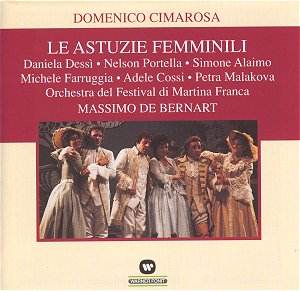 Composer: Domenico Cimarosa
Composer: Domenico Cimarosa
Works: Le Astuzie Femminili, Opera in two acts
Performers: Nelson Portella (bass – Il Signor Giampaolo), Daniela Dessì (soprano – Bellina), Simone Alaimo (baritone – Dottor Romualdo), Michele Farruggia (tenor – Filandro), Adele Cossi (soprano – Ersilia), Petra Malakova (mezzo-soprano – Leonara)
Recording: 3rd August 1984, Teatro Verdi, remastered DDD
Label: WARNER FONIT 8573 83528
Domenico Cimarosa, a prominent figure in the late 18th century, often finds himself overshadowed by the towering genius of Mozart. Nevertheless, Cimarosa’s operatic works, particularly “Le Astuzie Femminili,” which premiered in 1794, deserve recognition not merely as imitations of their more celebrated contemporaries but as unique contributions to the operatic canon. The opera is characterized by its lighthearted buffa style, replete with comedic disguises and romantic entanglements, a testament to the genre’s enduring appeal. This recording captures the vibrant essence of Cimarosa’s work, emphasizing the joy and spontaneity that animated his compositions.
The performance under Massimo De Bernart exhibits an infectious energy, with the orchestra of the Festival di Martina Franca providing a buoyant accompaniment that allows the singers to shine. Notably, the orchestra navigates Cimarosa’s whimsical score with a deft touch, alternating tempos and moods that enhance the comedic elements. The recording quality is commendable, with clarity in both orchestral and vocal lines, allowing Cimarosa’s intricate interplay between singers and the orchestra to come to the fore. Each aria and ensemble is rendered with a vibrancy that invites the listener into the operatic world, though at times, the orchestral exuberance nearly overshadows the vocal lines.
Nelson Portella’s portrayal of Il Signor Giampaolo is engaging, and his rich bass voice carries the character’s humorous undertones well. His arias, notably the hummable “Quando il mondo,” exemplify Cimarosa’s gift for melody, though the buffa characterization might not fully resonate in the audio format as it would in a live performance. Daniela Dessì, as Bellina, demonstrates her vocal prowess particularly in the ensemble pieces, where her interactions with Portella create a delightful tension. The chemistry between them is palpable, especially in the duet “Addio per sempre,” which showcases both singers’ ability to blend their voices while also highlighting their individual strengths.
Simone Alaimo as Dottor Romualdo emerges as a standout, his baritone rich and nuanced, providing a counterbalance to the lighter voices around him. His expressive delivery in “Ecco il mio dolce amore” is a highlight, revealing Cimarosa’s ability to infuse lyrical beauty into his buffa operas. On the other hand, Michele Farruggia’s Filandro takes time to find his footing; while he eventually brings a pleasing tonal variation to his performance, early moments seem slightly tentative. This journey from initial uncertainty to vocal confidence mirrors the opera’s own narrative arc of transformation and discovery.
The supporting roles, while less prominent, contribute essential color to the overall tapestry. Adele Cossi’s portrayal suffers slightly from a lack of the playful energy required for her character, and some off-key moments detract from her otherwise lyrical contributions. Conversely, Petra Malakova’s performance is commendable, and she rises to the occasion with an aria that captures both grace and charm, though the expectations of Mozartian finesse linger in the air.
The absence of a synopsis or full libretto in the accompanying booklet may pose a challenge for listeners unfamiliar with the narrative, yet the extensive commentary on character dynamics and musical highlights compensates for this omission. Cimarosa’s disregard for strict musical form allows for a delightful spontaneity that is well captured here, with the fluidity of tempo changes enhancing the comedic timing of the operatic narrative.
This recording of “Le Astuzie Femminili” is a joyful celebration of Cimarosa’s artistry, offering a refreshing alternative to the more frequently performed works of his contemporaries. The combination of spirited performances, a lively orchestra, and the light-hearted charm of the score makes for an engaging listening experience. For those seeking an operatic experience that is not only entertaining but also rich in musical delight, this recording stands as a worthy addition to any collection.